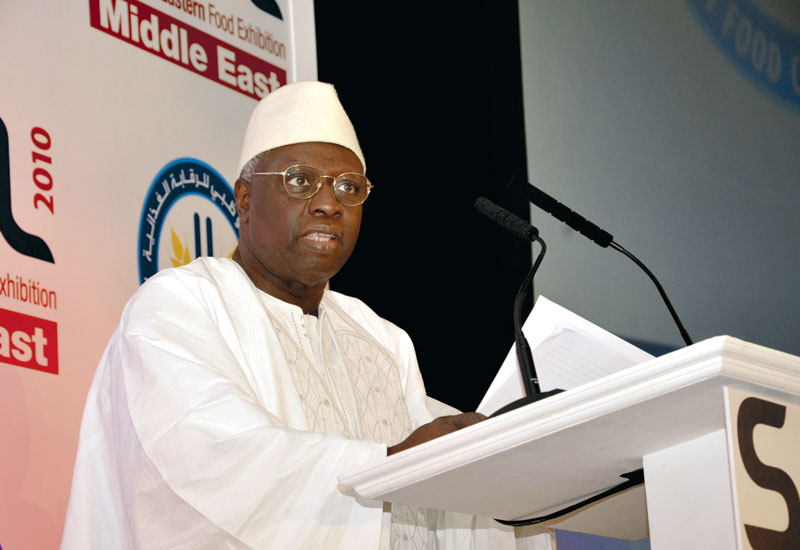 Dr Jacques Diouf, director general, Food and Agriculture Organisation of the United Nations talks to SIAL attendees
Dr Jacques Diouf, director general, Food and Agriculture Organisation of the United Nations talks to SIAL attendees
Why sustainability and CSR in the F&B industry were the most talked about trends at SIAL
Sustainability was the buzzword at the first SIAL Middle East conference, held last month at Abu Dhabi National Exhibition Centre, where companies clamoured to show off their eco-credentials.
As well as pushing organic produce, locally sourced food and natural ingredients, companies were also keen to show they had a heart by promoting environmental issues such as energy saving and waste reduction, while food and beverages group Agthia announced a new partnership with the World Food Programme — which will see the company assisting the Programme in providing food to some of the poorest people in the world.
Sustainable food
One organisation raising awareness of environmental issues at the event was Farmers’ Services Centre Abu Dhabi, whose marketing chain manager Peter Ensor highlighted the importance of creating a sustainable way to grow food. He said that the exhibitors at the show had reacted positively to the company’s eco-friendly message.
“We have been talking about composting, about waste water and one of our raison d’êtres is about conserving water or reducing water usage so we are about sustainability and best practice,” he said.
“You have to really have a sustainable angle to be successful. We can’t keep wasting resources. We’ve only got so much land and we can only grow so much on that land. We are not looking at genetic modification so normal agriculture, normal practices, a growing population, people who want more protein through livestock — there’s a huge, huge need to make sure that there is something there for the next generation.”

Advertisement
The move towards sustainability could be seen across the exhibition, said Turret Media group exhibition director Fadi Saad.
“[Being sustainable] is one of the fundamentals of the Abu Dhabi government policies,” he said.
“Abu Dhabi focuses a lot on sustainability and on environmental issues and this has helped the show practically to attract all these VIPs and exhibitors. Companies now are interested in being environmentally friendly because consumers have become more aware and choosier and are more and more inclined to buy these products,” added Saad.
Corporate social responsibility
Linked to the issue of sustainability in F&B is the need for companies in the sector to priorities their CSR programmes, another hot topic of discussion at SIAL. At the Ministerial Forum on Integrated Food Policies, Dr Jacques Diouf, director general, Food and Agriculture Organisation of the United Nations, spoke to attendees about the importance of food production and farming in the developing world.
“The food crisis and economic crisis have had a severe impact on millions of people in all parts of the world — those suffering from undernourishment need immediate assistance to prevent a worsening of their situation and the recent crisis has focused attention on meeting their needs,” Diouf said.
“However, the increase in hunger and malnourishment over the last three years reveals an inadequacy of the global food system and the urgent need for structural change.
“In the short term, social protection programmes must be established… to reach those most in need. The collection of reliable information on food commodity markets is essential. Simultaneously, small scale farmers need improved access to indispensable means of production and technologies such as high quality seeds, fertilizers, farming tools, and equipment that will allow them to push production and conservation with the increase and improvement of their storage capacity,” he added.
The wave of conscientious consumerism has also made its way in to kitchens around the Middle East, according to Le Meridién Abu Dhabi executive chef Dominique Morin, who explained that environmental considerations now played a major role in the catering industry.
“We are working on that environment now so it is not a new law, but a new recommendation from the authorities so we are working on that now. We have started [looking at environmental issues] many years ago but now it is coming more from the authorities and we have to educate associates. In a certain way, the trend is coming from the customer as well,” he said.
There is no doubt that the sustainability trend is sweeping the Middle Eastern food and beverage market, with suppliers, producers, chefs and authorities all getting involved in the environmental action — let’s hope that the trend continues and that the F&B industry in the Middle East helps to lead the way to a more sustainable future.








 Search our database of more than 2,700 industry companies
Search our database of more than 2,700 industry companies










Jan 2, 2011 , Australia
Great and timely topic. This is why many Exec Chefs are using Herbal-Active which is a natural antimicrobial. A 1% solution kills both food pathogens (making fresh food safer) and also food spoilage organisms. This reduces wastage from fresh food deteriorating from microbial degradation. Herbal...